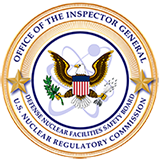Audit of the U.S. Nuclear Regulatory Commission’s Web-Based Licensing System
The audit objective was to determine if the Web-Based Licensing (WBL) System effectively manages the U.S. Nuclear Regulatory Commission’s (NRC) materials licensing and inspection information and provides for the security, availability, and integrity of the system data.
Audit of the U.S. Nuclear Regulatory Commission’s Management and Oversight of Research and Development Grants
The audit objective was to determine if the U.S. Nuclear Regulatory Commission (NRC) is effectively managing and monitoring selected research and development grants in accordance with applicable federal requirements, agency policies and guidance, and award terms and conditions.
Performance Audit of the U.S. Nuclear Regulatory Commission’s Compliance with the Requirements of the Payment Integrity Information Act of 2019 for Fiscal Year 2024
The objective of our audit was to assess the NRC’s compliance with the Payment Integrity Information Act of 2019 for fiscal year 2024 in accordance with Office of Management and Budget Memorandum M-21-19, Appendix C to OMB Circular No. A-123, Requirements for Payment Integrity Improvement, dated March 5, 2021. The OIG found that the NRC complied with the requirements of the Payment Integrity Information Act of 2019 for Fiscal Year 2024.
Evaluation of the U.S. Nuclear Regulatory Commission’s Telework Program
The Office of the Inspector General identified several issues with the use and oversight of the U.S. Nuclear Regulatory Commission’s telework program, including missing telework agreements and inaccurate telework records, both of which are required by law for proper program administration. Additionally, we found inadequate compliance with documentation standards, which could result in inconsistent adherence to policies and inaccuracies in employee records.
Performance Audit of the U.S. Nuclear Regulatory Commission's Implementation of the Federal Information Security Modernization Act of 2014 for Fiscal Year 2024 Region III: Naperville, Illinois
The OIG contracted with Sikich CPA LLC to conduct the Performance Audit of the NRC’s Implementation of the Federal Information Security Modernization Act of 2014 for Fiscal Year 2024 Region III: Naperville, Illinois. The objective was to assess the effectiveness of the information security policies, procedures, and practices of the NRC Region III facility. The findings and conclusions presented in this report are the responsibility of Sikich. The OIG’s responsibility is to provide oversight of the contractor’s work in accordance with generally accepted government auditing standards.
Performance Audit of the U.S. Nuclear Regulatory Commission’s Implementation of the Federal Information Security Modernization Act of 2014 for Fiscal Year 2024 Region IV: Arlington, Texas
The Office of the Inspector General contracted with Sikich CPA LLC to conduct this audit. Its objective was to assess the effectiveness of the information security policies, procedures, and practices of the U.S. Nuclear Regulatory Commission Region IV facility. The findings and conclusions presented in this report are the responsibility of Sikich. The OIG’s responsibility is to provide oversight of the contractor’s work in accordance with generally accepted government auditing standards.
Performance Audit of the U.S. Nuclear Regulatory Commission’s Implementation of the Federal Information Security Modernization Act of 2014 for Fiscal Year 2024 Technical Training Center: Chattanooga, Tennessee
The Office of the Inspector General (OIG) contracted with Sikich to conduct this performance audit. The objective was to assess the effectiveness of the information security policies, procedures, and practices of the U.S. Nuclear Regulatory Commission’s (NRC) Technical Training Center (TTC). The findings and conclusions presented in this report are the responsibility of Sikich. The OIG’s responsibility is to provide oversight of the contractor’s work in accordance with generally accepted government auditing standards.

